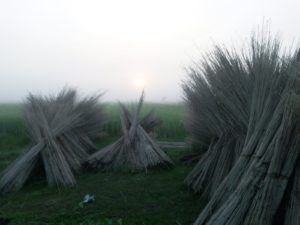Dhaka Times Desk Farmers of Kushtia are also coming into modernity. They are now leaning towards eco-friendly agriculture. which will serve as a model for other parts of the country.

It is evident that eco-friendly agriculture is the need of the hour. In which increasing the fertility of the land by natural means, reducing the use of chemical pesticides and increasing the use of alternative fuels are significant. One of the ways to increase the fertility of the land naturally is the cultivation of sorghum.
Citing research, a report said that when the dhaincha plant is slightly larger and crushed into the ground, the fertility of the land increases several times. There is also widespread use of dhaincha as an alternative fuel. Due to the development of eco-friendly agriculture, Dhincha cultivation has increased at a significant rate in Bangladesh. During the current monsoon season, visiting different upazilas of Kushtia, it was seen that only Dhaincha is being cultivated in most of the lands. Thousands of farmers in various villages have been encouraged to cultivate dhaincha on a large scale to increase soil fertility and use alternative fuel for agricultural and household work. It is learned that they are now spontaneously cultivating dhaincha.
Farmers of Dighalkanda village of Rifaitpur union of Daulatpur upazila said that cultivation of dhaincha during the non-cultivating season increases the fertility of the land. After this, whatever crops including paddy can be cultivated on the land, bumper yield is obtained. Farmers said that earlier they used to leave the land idle during this season. Now by cultivating dhaincha, they are making the land fertile for the next cropping season, as well as using dhaincha as chalk to meet the demand for alternative fuel. Mozammel, a farmer of Dighalkanda village, while talking to the journalists, said that daincha also has economic utility. We are also making profit by selling its seeds. Dhaincha is a crop that absorbs nitrogen from the air and stores it in its roots. Therefore, nitrogen and organic matter are increased in the soil through this dhaincha cultivation. Dhincha plantation is widely used in many countries of the world. Bangladesh government is also making various efforts to make farmers interested in dhaincha cultivation. British-American Tobacco Bangladesh (BAT Bangladesh) has been running various campaigns since 2000, awareness activities, distribution of free seeds to farmers and awareness programs about their dhaincha farming practices since 2000 to support the government in this work. BAT Bangladesh aims to bring 75 percent of its registered farmers under Dhincha cultivation by 2014. For this purpose, in 2011 the organization distributed 1 lakh 52 thousand kg and in 2012 2 lakh kg of dhaincha seeds free of cost. This year more than 50 percent of the farmers registered with the organization have cultivated dhaincha.

A large section of farmers in Greater Kushtia are now dependent on dhaincha cultivation to increase soil fertility and dhaincha chalk for domestic and agricultural fuel. They have moved away from the traditional way of cutting trees and making fuel. BAT Bangladesh is encouraging its registered tobacco growers to use dhinchar sticks, tobacco sticks, jute sticks, rice straw, bran, sugarcane husks and other crop residues to use alternative fuel to wood at every stage of tobacco processing. In Kushtia region, the company grows Flu Cured Virginia (FCV) variety of tobacco. All FCV tobacco produced in the region is currently being processed using alternative fuels, farmers said.
Another important aspect of eco-friendly agriculture is trying to reduce the use of chemical pesticides. The use of organic pesticides or different types of traps rather than chemical pesticides can prevent pest infestation in the land, as well as protect the land and crops from toxic chemicals. Farmers in Kushtia are currently using neem leaf solution and different types of traps on a large scale to effectively shift away from chemical pesticides to alternative pesticides. To make them interested in these activities, Integrated Pest Management Clubs (IPM Clubs) have been established in various villages of Kushtia under the initiative of BAT Bangladesh, BAT Bangladesh has established 35 IPM clubs in the country so far. 37 FFS sessions have been completed so far in these clubs. The organization said that they have plans to set up at least 10 more IPM clubs across the country within this year.
Besides, it is known that BAT Bangladesh is providing proper technical know-how and assistance in making compost pit at low cost to produce organic fertilizers in the backyard of tobacco farmers in eco-friendly farming. If these projects are launched, Kushtia will be considered as a model of the country, the people concerned with it think. They think that if it is successful in this region, the farmers in other parts of the country will also be encouraged. This project of Kushtia region will be considered as a model to make the people aware about the harmful effects of artificial fertilizers and encourage them to produce healthy crops through eco-friendly crop production. Which is desired by every conscious person of the country.


